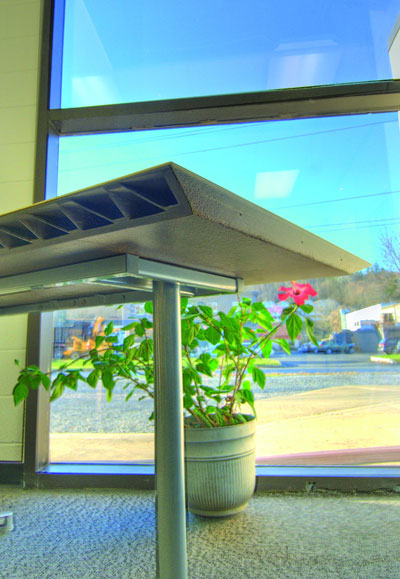A new Cornell-based company offers a better building material
A new Cornell-based company offers a better building material
It’s everywhere—in your couches, tables, desks, cabinets, bookshelves, and cubicles. For decades, particle board or fiberboard made from wood composites has been a staple of residential and office furniture. Although the veneer-covered boards reduce the cost of wood products, they are environmentally problematic because they contain formaldehyde—a classified carcinogen.
But the composites found in furniture and other products may soon go green, thanks to research by fiber science professor Anil Netravali. With Patrick Govang, a former director of the Cornell Center for Materials Research, Netravali co-founded e2e Materials Inc., which produces sustainable desktops—made from a composite of soy flour and natural fibers—at a factory in Geneva, New York.
Relocated from a smaller plant in Ithaca with the help of a $1.25 million state grant, the production facility opened in January and is already supplying desktops to a technology company in Silicon Valley. With its headquarters based in Ithaca, e2e (which stands for “earth to earth”) is expected to create about 200 jobs over the next four years as it diversifies its products and expands its customer base. “The key to e2e is that the products are not made out of particle board, and there’s zero formaldehyde or other noxious or poisonous chemicals,” says Zach Shulman ’87, JD ’90, a senior lecturer at the Johnson School and managing partner of the Cayuga Venture Fund, which has invested more than $1 million in e2e. “It’s green technology.”

Since it was established in 2006, e2e has earned kudos from regional and national business and trade organizations. In February, its Transform Worksurface product received the Award for Composites Excellence from the American Composites Manufacturers Association. The company also won the 2007 Upstate New York Emerging Business Competition—including a $100,000 prize—from the New York Business Development Corporation and M&T Bank.
A co-founder of three companies spun off from his research, Netravali began experimenting with biodegradable composites in 1993, aiming to develop a sustainable product that did not rely on petroleum-based resins. He notes that about 6 to 8 percent of petroleum production goes to make chemicals, fibers, and polymers. “If we don’t have petroleum, what will we do then?” he asks. “We will have hybrid and electric cars, but not many people think, If we don’t have petroleum, how will I get my polyester and plastics?”
For Netravali, there was one clear answer: plants. His first petroleum-free, sustainable composite derived from a material called polyhydroxybutyrate-co-valerate (PHBV), a sustainable polymer formed by microbial fermentation. But when the company that supplied PHBV stopped manufacturing it—claiming that competing with petroleum-based polymers had become too expensive—Netravali turned to soybeans, which are widely grown around the world.
In his lab at the College of Human Ecology, Netravali and his students extracted the protein from soybeans and removed the oil from the remaining solids; this yielded defatted soy flour, which became the resin that is reinforced to form composites. The combination of the powdery soy flour and a mesh of natural fibers (such as jute, hemp, and flax) produced a composite that is five to six times as strong as particle board. Because of its stiffness and strength, the green composites can be manufactured using one-third of the material by weight, compared to standard particle board. The use of soy protein as a resin also eliminated the need for formaldehyde, a volatile organic compound that can cause lung problems as it outgases into the environment, especially in airtight buildings. “The formaldehyde issue is something that we have an elegant solution for that no one else can offer,” says Govang, the company’s president and CEO.
After e2e was launched, its first client was Comet Skateboards, a company that Jason Salfi ’92 founded in San Francisco in 1997. While researching how he could make his boards more environmentally friendly, Salfi came across one of Netravali’s papers. After visiting the professor, Salfi moved his manufacturing operation to Ithaca in 2007. “We did that to be as close to the source of the raw materials as possible,” says Salfi, who majored in natural resources management.
Another potential benefit of e2e’s production could be a resurgence of the flax crop in the Finger Lakes. Govang is working with the Cornell Agricultural Experiment Station to develop regionally grown flax as the composites’ fiber source and estimates that a supply from 200 farms would meet the demand. Locally sourcing the raw material would transform the production of typical furniture, most of whose components now travel more than 20,000 miles because they are produced in China with petroleum products from the Middle East and wood chips shipped from the northwestern U.S. or Canada. “Our vision,” Govang says, “is to take that 20,000 miles and reduce it to less than 200.”


